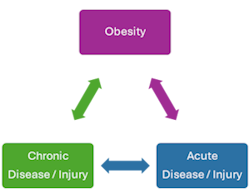Weight Bias and Stigma
- Marian Brock-Andersen
- Jun 17
- 3 min read

Our society has been filled with the message that overweight people are unhealthy, lazy, morally lacking, undisciplined, and to blame for their weight and all its problems. Those who have struggled with weight control know this is false but often feel shame, guilt, and helplessness.

So, What Is The Truth?
Obesity is part of a complex and dynamic relationship with our overall health. A person's weight is not a direct indicator of health; however, weight can be a symptom of acute or chronic illness or a contributing factor in acute or chronic illness.
Very few people with obesity can lose and maintain a lower body weight and improve their health through diet and exercise alone due to genetic and metabolic adaptations that are not within our control. Research indicates that the metabolic impact of dieting is often of limited benefit or even detrimental. Constant dieting can lead to muscle loss rather than fat loss, nutritional deficits or imbalances, increased mental health concerns, and increased risk of eating disorders.
Some individuals lack normal hunger and satiety signaling, equating fullness solely with the physical sensation of the stomach stretching, leading to overeating. They often state that they are 'never not hungry' or 'never feel full.' They may also frequently state that they 'could eat' when asked if they are hungry. You are not greedy, gluttonous, or overindulgent, nor do you lack willpower.
Speaking Up / Self-Advocacy
Words matter.
The placement of words in a statement conveys emphasis; by stating the disease first, there is an implication of priority on the disease rather than on the person. You are not the disease; you are a person with a disease or chronic condition. You have the right to insist that everyone, including healthcare professionals, address you and your health with respect and dignity.
Person First Language
I am a person with obesity
I have obesity
I am being treated for obesity

Likewise, you have the right to advise others of words that you find offensive. Consider how people talk to you or about you regarding your weight, and how words are used in the media and marketing. Here are some examples of how we can improve our approach to discussing obesity.
Words that can imply bias | Words that Convey Neutrality |
Weight Loss Medications | Anti-Obesity Medications |
Weight Management | Chronic Obesity Treatment |
Larger Size | Excessive Energy Stores |
Heaviness | BMI / Body habitus |
Obese | Obesity |
Morbid / Extrem / Severe | Healthy / Unhealthy |
Fat / Fatness | Weight |
Challenges of People's First Language
I struggle with the desire to use person-first language because it conflicts with the need to communicate my message and services effectively. If most people who could benefit from my help don't understand what obesity management and obesity medicine entail, what should I do? I decided to use both terms, as this approach not only helps me reach a wider audience but also educates and familiarizes the community with these concepts. This way, we can work towards treating obesity like any other medical condition, such as hypertension or diabetes.
So, What Is The Goal?

We need to reinforce with our society that obesity is part of a complex and dynamic relationship with our overall health. A person's weight is not a direct indicator of health; however, weight can be a symptom of acute or chronic illness or a contributing factor in acute or chronic illness..





Comments